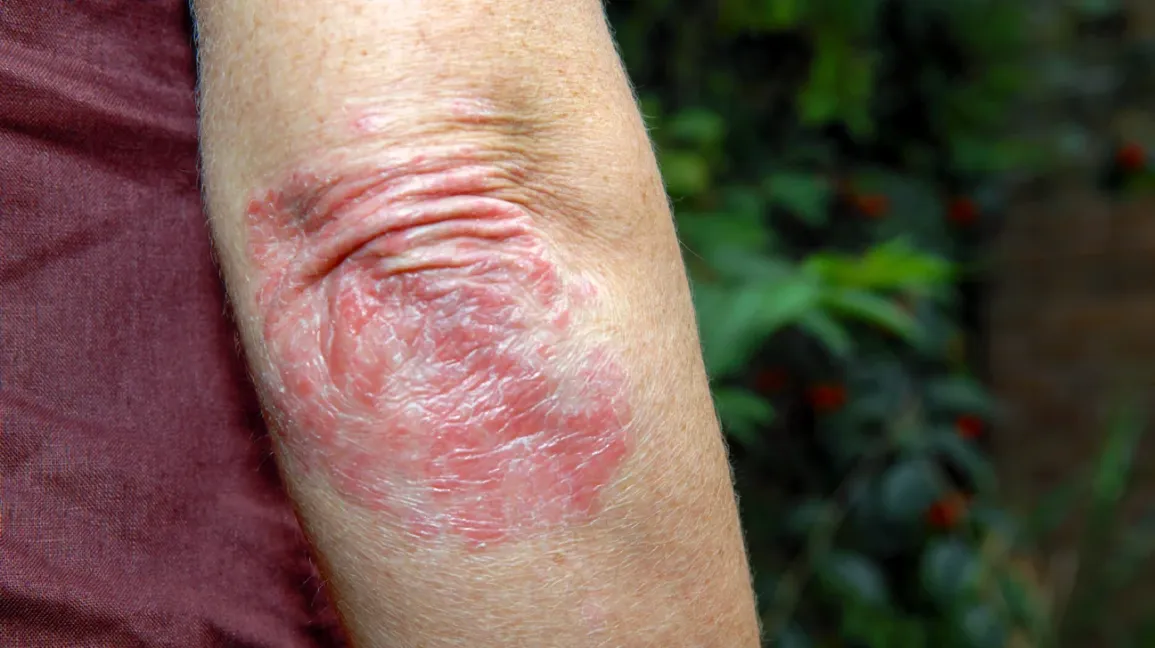Understanding Psoriasis: A Holistic Approach to Management through Homeopathy and Home Remedies
- 16 Sep 2024
- 0 Comments
- Homeopathy
Psoriasis is a chronic autoimmune skin condition that accelerates the life cycle of skin cells. This condition leads to the buildup of cells on the skin’s surface, forming scales and red patches that can be itchy, painful, and often emotionally distressing. While conventional treatments typically focus on symptom management, homeopathy and natural home remedies offer a holistic approach to addressing the root causes of psoriasis, fostering both physical and emotional healing.
In this blog, I will walk you through a detailed understanding of psoriasis, its causes, and most importantly, homeopathic remedies and natural home-based cures to help manage this condition.
What is Psoriasis?
Psoriasis is a skin disorder that causes rapid skin cell turnover, leading to the buildup of dead skin cells on the skin’s surface. It can appear anywhere on the body but is most commonly found on the scalp, elbows, knees, and lower back. There are several types of psoriasis, including:
1. Plaque Psoriasis: The most common type, characterized by raised, inflamed red patches covered with silvery-white scales.
2. Guttate Psoriasis: Small, drop-shaped lesions that appear on the arms, legs, and torso.
3. Inverse Psoriasis: Found in skin folds, such as armpits or groin, with smooth, red patches of skin.
4. Pustular Psoriasis: White pustules surrounded by red skin.
5. Erythrodermic Psoriasis: A rare but severe form that can cover the entire body with a red, peeling rash.
What Causes Psoriasis?
Psoriasis is an autoimmune disease, meaning the body’s immune system mistakenly attacks healthy skin cells, accelerating their production. The exact cause remains unknown, but several factors can contribute to the onset of psoriasis, including:
• Genetics: A family history of psoriasis increases the likelihood of developing the condition.
• Immune System Dysfunction: The immune system mistakenly triggers inflammation, accelerating the production of skin cells.
• Environmental Triggers: Factors such as stress, infections, certain medications, alcohol consumption, and smoking can trigger flare-ups.
• Weather: Cold, dry weather conditions tend to worsen symptoms.
• Injury to the Skin: Cuts, scrapes, and severe sunburns may trigger the development of psoriasis.
Symptoms of Psoriasis
• Red patches of skin covered with thick, silvery scales
• Dry, cracked skin that may bleed
• Itching, burning, or soreness
• Thickened or pitted nails
• Stiff, swollen joints (if psoriatic arthritis is present)
Homeopathic Approach to Psoriasis Management
Homeopathy takes a holistic approach to treating psoriasis by considering the person as a whole—both their physical and emotional states. Rather than suppressing symptoms, homeopathy aims to stimulate the body’s self-healing mechanism. In homeopathy, each remedy is highly individualized and tailored to the specific symptoms and personality traits of the person.
Here are some commonly prescribed homeopathic remedies for psoriasis:
1. Arsenicum Album
• For Dry and Itchy Skin: This remedy is ideal for individuals who experience dry, rough, and scaly skin with intense itching. Psoriasis cases where the skin becomes worse at night or after exposure to cold are well-treated with this remedy.
• Emotional Aspect: It is often recommended for patients who are anxious, restless, and worried about their health.
2. Graphites
• For Thick and Crusty Skin: This remedy works well for psoriasis that presents with thick, crusty patches of skin, especially in skin folds. It is often used when there is a sticky discharge from lesions.
• Emotional Aspect: People who benefit from Graphites tend to be shy, reserved, and may suffer from anxiety and depression.
3. Sulphur
• For Itching and Burning Sensation: Sulphur is one of the top remedies for treating itching and burning skin associated with psoriasis. It is beneficial for individuals whose symptoms worsen with heat and scratching.
• Emotional Aspect: Sulphur patients may display irritability and frustration, often seeking relief through vigorous scratching.
4. Sepia
• For Psoriasis in Women: Sepia is commonly prescribed for women who experience psoriasis as a result of hormonal changes. It is especially useful when psoriasis worsens during pregnancy, menopause, or after childbirth.
• Emotional Aspect: Women who require Sepia are often overwhelmed, indifferent, or emotionally detached.
5. Petroleum
• For Cracked and Painful Skin: This remedy is highly effective for psoriasis that leads to cracked and painful skin, especially during colder months. Petroleum works well for areas where the skin becomes thickened and chapped.
• Emotional Aspect: Patients who benefit from Petroleum often have a history of motion sickness and tend to be forgetful and irritable.
6. Psorinum
• For Persistent Psoriasis: Psorinum is often used in cases where psoriasis is stubborn and recurs frequently. It is also helpful for individuals with dry, rough skin and intolerant to cold weather.
• Emotional Aspect: It is prescribed for patients with a pessimistic outlook who fear the worst and worry excessively.
Natural Home Remedies for Psoriasis
In addition to homeopathic treatment, natural home remedies can provide relief from the discomfort of psoriasis and help manage flare-ups.
1. Moisturize Regularly
• Keeping your skin moisturized is essential in managing psoriasis. Dry skin can aggravate symptoms, so use thick, fragrance-free moisturizers or natural oils like coconut oil to lock in moisture.
2. Use Epsom Salt Baths
• Soaking in a warm Epsom salt bath can help reduce inflammation, itching, and scaling. It also soothes irritated skin. After bathing, make sure to apply a moisturizer to avoid drying out the skin.
3. Aloe Vera
• Aloe vera has cooling and anti-inflammatory properties that can soothe red, inflamed skin and promote healing. Applying fresh aloe vera gel directly to psoriasis patches can offer relief.
4. Apple Cider Vinegar
• Apple cider vinegar can relieve scalp psoriasis and help reduce itching. Dilute apple cider vinegar with water and apply it to the scalp. Rinse it off after a few minutes to avoid irritation.
5. Sunlight Therapy
• Controlled exposure to natural sunlight (UVB rays) can help slow skin cell turnover and reduce scaling. However, it’s essential to avoid overexposure as sunburn can exacerbate symptoms.
6. Omega-3 Fatty Acids
• Incorporate omega-3-rich foods, such as flaxseeds, walnuts, and fatty fish (like salmon), into your diet. Omega-3s can reduce inflammation, which is beneficial for managing psoriasis flare-ups.
7. Turmeric
• Turmeric has potent anti-inflammatory properties and can help reduce the severity of psoriasis symptoms. You can include it in your diet or apply a turmeric paste directly to the skin.
8. Stress Management
• Stress is a significant trigger for psoriasis flare-ups. Incorporating relaxation techniques such as yoga, meditation, and deep breathing exercises can help lower stress levels and reduce symptom severity.
Dietary Recommendations for Psoriasis
Along with homeopathic remedies and natural cures, paying attention to your diet can also help manage psoriasis symptoms.
• Anti-Inflammatory Foods: Incorporate foods like leafy greens, berries, and fatty fish into your diet to help reduce inflammation.
• Avoid Triggers: Some people find that processed foods, red meat, and dairy products can worsen their symptoms. Try to identify any personal food triggers.
• Stay Hydrated: Drinking plenty of water helps maintain skin hydration and supports overall health.
Conclusion
Psoriasis is a challenging condition that requires a comprehensive and individualized approach. While conventional treatments primarily focus on symptom management, homeopathy offers a holistic solution by addressing the root causes of the disease and stimulating the body’s healing mechanism. Combined with natural home remedies, lifestyle changes, and stress management, homeopathy can provide lasting relief and improve the overall quality of life for those living with psoriasis.
If you’re considering homeopathy for your psoriasis, consult with a qualified homeopath to develop a personalized treatment plan. Along with homeopathic remedies, incorporating natural home remedies and adopting a psoriasis-friendly diet can make a significant difference in managing this chronic condition.

